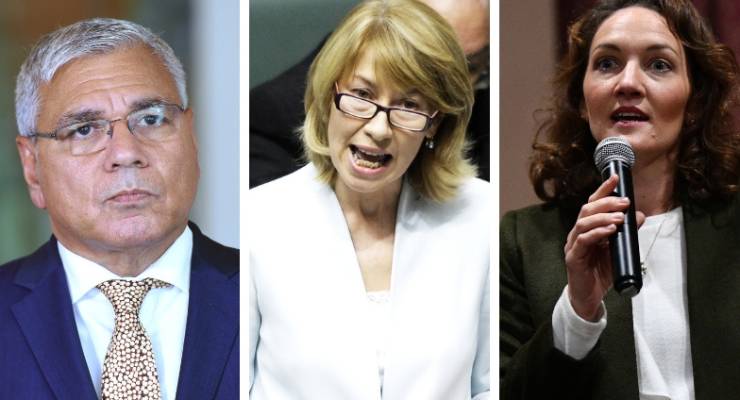
When Scott Morrison unveiled Indigenous politician Warren Mundine as his captain’s pick to run in the marginal NSW seat of Gilmore, it angered many local branch members, including preselected candidate Grant Schultz, who quit to run as an independent. Mundine has never lived in Gilmore, on the South Coast of NSW, but referred to the area as his “ancestral home”.
Mundine’s candidacy in a seat where he doesn’t live is hardly new. Australian politics is filled with instances of high-profile candidates being parachuted into seats to which they often have little connection.
The celebrity
In 2004, the ALP pulled off arguably the biggest celebrity coup in Australian political history, when rock star and environmental activist Peter Garrett became their candidate for the safe seat of Kingsford Smith in Sydney’s East. But it wasn’t an easy road for the Midnight Oil frontman — local branch members were incensed with Mark Latham’s pick, labelling Garrett an outsider. Meanwhile, the Construction Forestry Mining and Energy Union, unimpressed with Garrett’s opposition to logging, labelled his selection “a pathetic version of political celebrity squares”.
Three years later, prominent ABC journalist Maxine McKew approached Kevin Rudd, offering to sell her Mosman home and move in to John Howard’s seat of Bennelong in a bid to unseat the prime minister. McKew was successful in the ensuing Rudd-slide, making Howard just the second sitting PM to lose their seat. McKew would only last one term after another minor celebrity, retired tennis player John Alexander, won back the seat for the Liberals. After his victory, Alexander was still real estate shopping in the electorate.
Labor remained partial to a dose of celebrity and, in 2013, Julia Gillard made Nova Peris, Australia’s first Indigenous Olympic gold medalist, a senator for the Northern Territory. While Peris is from the Northern Territory, the nature of her celebrity appointment, and Gillard’s personal interference angered rank and file members in the state. Trish Crossin, the long-serving senator who was replaced by Peris slammed Gillard’s lack of consultation, while some Labor insiders cynically viewed the pick as a way to bolster the PM’s numbers in a potential leadership battle with Kevin Rudd.
The failed ‘out of towner’
When Malcolm Turnbull quit parliament last year, the Liberals overruled Scott Morrison’s wishes and turned to Dave Sharma — the fresh-faced former ambassador to Israel — for the seat of Wentworth. Unfortunately, Sharma lived in the leafy upper north shore suburb of Turramurra, 24km away from the eastern suburbs electorate. Despite being the first conservative to lose Wentworth since Federation, Sharma is determined to have another crack this year, armed this time with a $2.6 million terrace in the right electorate.
In another 2018 byelection Georgina Downer, daughter of former foreign minister Alexander Downer, ran unsuccessfully for her father’s old seat of Mayo in South Australia. Downer, who grew up in the area, announced that she was “coming home”. But the fact that Downer had spent most of her adult life in Melbourne, and had sought pre-selection in the Victorian seat of Goldstein two years earlier did little to quell local suspicion she was a “blow-in”. Downer was comfortably beaten by the Centre Alliance’s Rebekha Sharkie but, like Sharma, she will be back for more this year.
The party hack
Sometimes a parachute candidate comes in the form of a party elder brought in for a new political challenge. Before scandal-ridden backbencher Barnaby Joyce was member for New England, he was a senator for Queensland. Joyce had lived in Queensland for more than 20 years, he was raised around Tamworth, and when popular independent MP Tony Windsor stepped down, Joyce got the move to the lower house he’d always wanted. But, despite moving his family to Tamworth, Joyce refused to change his State of Origin allegiances from Queensland back to NSW.
Bennelong has had its fair share of star candidates, and the 2017 byelection was no different with former NSW premier Kristina Kenneally quitting her Sky News gig to run against John Alexander. Kenneally, who lived 800m outside the electorate, lost the byelection but landed a senate seat just two months later after Sam Dastyari’s exit.
One last honourable mention must go to the greatest parachute campaign that never happened — Joh for Canberra. In 1987, a bunch of Gold Coast businessmen convinced Queensland premier Joh Bjelke-Petersen to run for prime minister against Bob Hawke. The Joh for Canberra campaign ultimately fell flat, but did manage to divide the Coalition and give Hawke an election victory he might not have won without Bjelke-Petersen’s intervention.








Crikey is committed to hosting lively discussions. Help us keep the conversation useful, interesting and welcoming. We aim to publish comments quickly in the interest of promoting robust conversation, but we’re a small team and we deploy filters to protect against legal risk. Occasionally your comment may be held up while we review, but we’re working as fast as we can to keep the conversation rolling.
The Crikey comment section is members-only content. Please subscribe to leave a comment.
The Crikey comment section is members-only content. Please login to leave a comment.